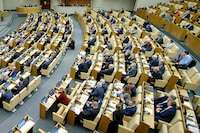The lower house of Russia’s parliament has passed the final reading of a bill that bans the promotion of “LGBT propaganda” to children, expanding on a law that was adopted in 2013.
Russia advances bill to criminalize ‘promoting’ LGBTQ relationships

The bill aims to prevent Russians from promoting or “praising” homosexual relationships or gender reassignment surgery or suggesting that they are “normal.”
Citizens who promote what the Duma dubs “the propaganda of nontraditional sexual relations” could be fined up to $6,600; organizations could be fined up to $82,100. Foreign nationals could be sentenced to up to 15 days and deported.
The legislation now moves to the upper chamber, which is expected to approve it, and to President Vladimir Putin, who is expected to sign it.
Rights activists say the legislation is an attempt to further oppress sexual minorities in Russia, who already face challenges in a conservative society that has historically prevented gay pride marches and targeted LGBTQ rights activists with impunity.
Tanya Lokshina, Europe and Central Asia associate director at Human Rights Watch, said the 2013 law was “an unabashed example of political homophobia.” The new legislation, she said, amplifies it in “broader and harsher ways.”
“The original ‘gay propaganda’ ban purported to protect children from ‘propaganda’ — broadly defined to mean any positive or neutral depiction of non-heterosexual relations,” Lokshina told The Washington Post. “The draft legislation, while maintaining aggravated penalties when children are involved, extends it to a blanket ban that covers all public information or activities.”
Lokshina described the bill as an attempt by the Kremlin to distract from growing discontent over Russia’s war against Ukraine and recent failures on the battlefield.
How the law would be applied is unclear. There have been few cases of individuals being tried for “gay propaganda” under the 2013 law, but it has increasingly been used to target cultural events, films and theater. Lokshina said LGBTQ parents are at particular risk.
Russian political activist Lucy Shtein said the legislation would prohibit “the representation of a huge part of society.”
“Fighting the visibility of LGBTQ+ people doesn’t in any way affect the number of such people, but only causes more suffering, forcing them to hide and hate themselves,” she said.
Shtein said Russia’s invasion of Ukraine has made LGBTQ people more vulnerable because it is now much more difficult to evacuate Russian citizens targeted by authorities. The Russian mobilization drive for new troops to fight in Ukraine and travel restrictions imposed on Russian citizens by foreign countries in the wake of the invasion have restricted Russians’ freedom of movement.
Human rights conditions in Russia have greatly deteriorated in the past year, Shtein said. The new legislation is “another nail in the coffin.”
“This war has shown that, for this government, any life is expendable and their repressions are particularly affecting communities that were already vulnerable before the war, including the LGBT community.”
LGBTQ rights have been scapegoated in Putin’s Russia, with many pundits associating them with Western-promoted, “anti-Russian” values. Lawmakers argue they are defending morality in the face of “decadent” values.
“LGBT [rights] today are an element of hybrid warfare, and in this hybrid warfare we must protect our values, our society and our children,” Alexander Khinshtein, one of the bill’s architects, said last month.






